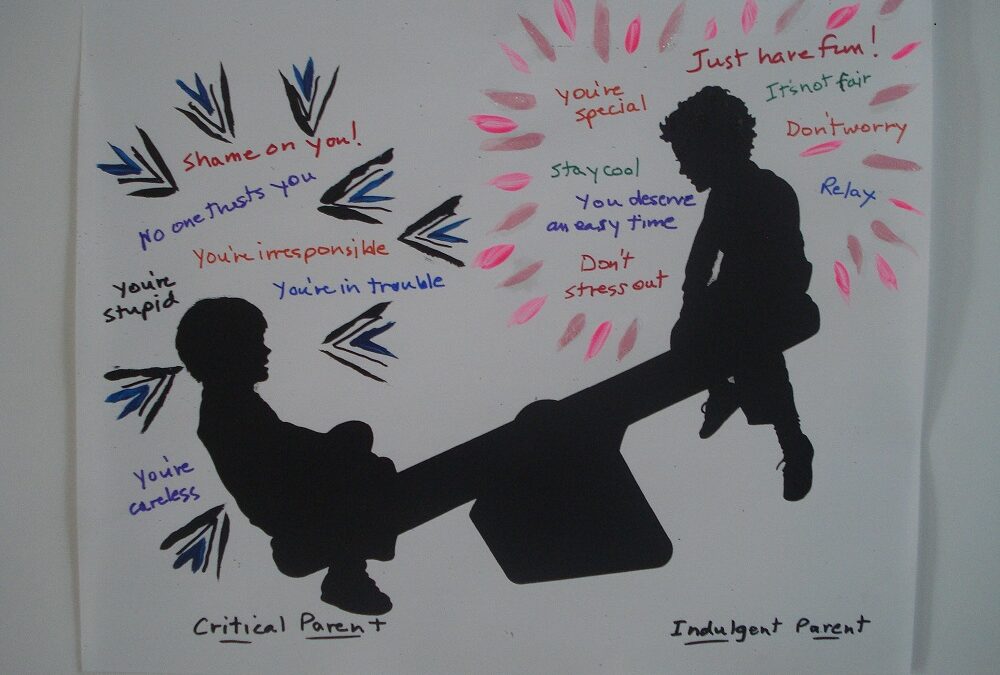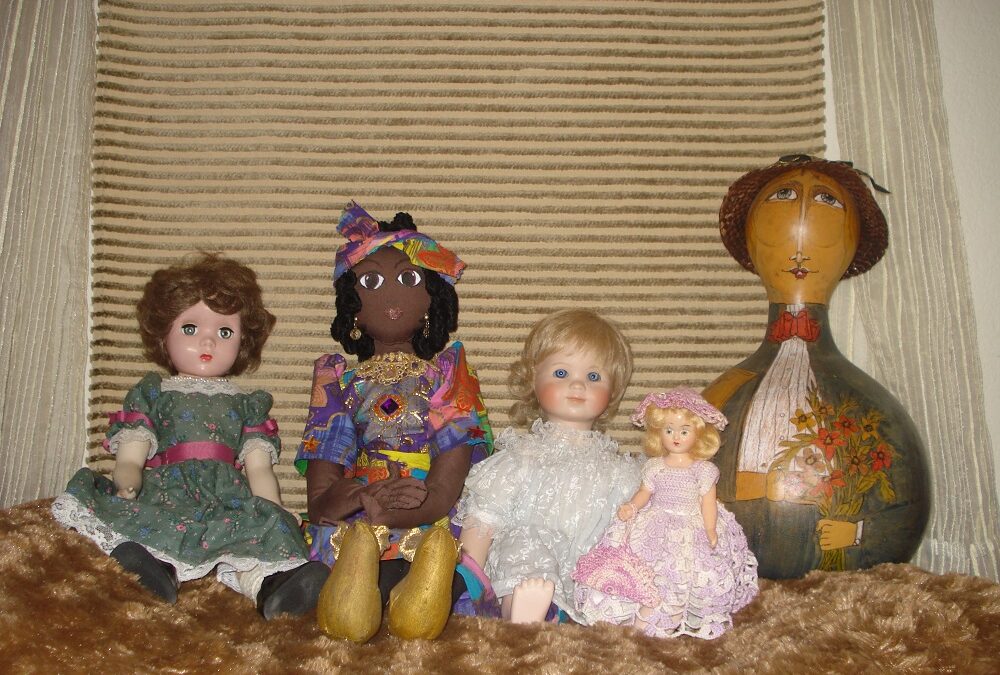
by wp-admin | Dec 9, 2021 | Exploring the Mental Fitness Formula
A see-saw of self-indulgence and self-punishment happens when you’re set up by your Indulgent Parent (IP). Your Critical Parent (CP) keeps you on a short leash so you can’t get into trouble, scolding your Child each time you fail to measure up to one of the six toxic beliefs your CP holds. Your Indulgent Parent soothes your child into a false sense of security as it supports the next six toxic beliefs.
Let’s take the example procrastination, Toxic Belief # 9, that it’s more comfortable to avoid than to face problems or responsibilities. This belief caters to your Child’s focus on present satisfaction rather than future security. Your Adult may caution, “Do I want the ice cream cone now, or the next-size-smaller pants in a month?” Then your Indulgent Parent whispers, “Oh, it won’t hurt to enjoy just this little treat. You deserve it. Why do today what you can put off until tomorrow?” Or you have a project for school or work that seems so difficult that you can feel your Child’s resistance in your gut. Your IP croons, “You don’t have to start that today; why not wait until you feel more up to it tomorrow?” It might add “It’s just not fair that they expect so much from you,” to encourage Belief # 11, that you’re special so you deserve an easier path.
A month later you’re still in the same size pants, your boss gives you a corrective action and your school project gets a failing grade. Your IP may still tell you it’s not fair or you don’t deserve such treatment, but your Critical Parent torments you for being lazy, irresponsible and lacking in character. Set up by your Indulgent Parent, you’ve traded future well-being for present comfort and your self-esteem has taken a hit. When this see-saw continues, it leads to decreased self-confidence, energy, hope and possible even to depression. Addiction is a frequent companion to this process, where your IP encourages using the drug-of-choice to gain temporary relief from the stress created by your failure to face problems or responsibilities. This process is described in detail in Part II, Chapter 2 of Claim Your Own Mental Fitness.
Your Adult must act with a firm hand to grab the see-saw and tell you to get off. It can identify Belief #9 along with any others involved. For example, your avoidance might have begun after you had a disappointing experience that prompted toxic belief #7, that it’s unbearable to work hard for something and not get it. Your IP may chime in to say, “you tried hard enough to (lose weight, get a promotion, get an A), so why keep trying?” Your Child’s Black and White thinking could prevent you from looking for new ways to cope: it’s fair or unfair, it’s easy or it’s too hard, you’re special or worthless.
Once you’re off the see-saw, and seated with a cool glass of water under a friendly tree, your Wise Parent (WP) could remind you that: 1. Black-and-white thinking traps you into quitting or avoiding, not creative problem solving. It’s better to consider how to cope in a different way. 2. When you put off doing something you have to do, you create low-level anxiety, not peace. You may also end up with additional problems that are even harder to manage. 3 It’s not unbearable if your aren’t rewarded each time you work hard for something; everyone has to learn how to deal with this sometime.
Your Adult can help you break up a task into bite-sized pieces Your Wise Parent can offer encouraging words like, “a journey of a thousand miles begins with a single step” or “remember when you did this well before and how you got there.”

by wp-admin | Dec 9, 2021 | Exploring the Mental Fitness Formula
Do you often feel like the only place you can find peace is one like this? People offer innumerable triggers for fight-or-flight reactions. While it’s wonderful to retreat to such an inspiring spot, it’s possible to be at peace, even when you’re with other people. Your Adult can learn to recognize another Child Brain Habit, Personalizing, that causes confusion when people interact. Like black & white thinking, its influence operates in more than one direction.
Personalizing is probably the main reason that human nature has a bad reputation. It’s so prevalent, it could be seen as humans’ default mode of reacting. It occurs when you blame yourself for negative things that happen to you, that were not in your control. It also occurs when you blame others for negative things that were out of their control. Sometimes we call this “taking things too personally.” Personalizing is a habit that increases fight-or-flight reactions in cases where at least four Toxic Beliefs are triggered.
1) Toxic Belief # 1, when you blame yourself.
After “Janet” and her husband divorced, she sought counseling for their three-year-old son “Winston.” He had come to her one morning and sadly commented, “I’m going to go away in an airplane.” She asked him why and he said, “then Mommy won’t cry and Daddy won’t cry.” He had personalized the cause of their pain. Heartbroken, she tried to assure him that the divorce wasn’t his fault, but he didn’t believe her and continued to be anxious and sad.
Winston’s mother and I struggled to find a way we could reach his three-year-old mind and relieve his guilt. Finally we remembered that Janet’s sister Elaine had a baby six months ago that Winston adored. We helped Winston imagine a time before he was born, by reminding him of when his little cousin was still in Elaine’s tummy. Once he got that, Janet told him, “even before you were in my tummy, Mommy was crying and Daddy was crying.” Winston responded immediately, like a huge weight had dropped from his shoulders.
Although Janet said she and her husband had an amicable divorce and had not fought over Winston, he still felt responsible. Very young children believe the world revolves around them; the baby cries and the parent comes. Belief #1 is true for young children, who actually do need the support and love of a parental figure to survive. Because of this, they need to be well- attuned to their parents’ feelings, as Winston was. By adulthood we could realize that we have little power to protect others from painful experiences, except for doing our best to treat them with kindness. Unfortunately, we don’t lose our original bias towards personalizing what others do. Wise parents help their children learn to manage this as Janet did with Winston.
Personalizing can especially stoke your fight-or-flight reaction to Belief #1 when someone you rely on seems to withhold her approval, attention, support or acceptance. Once you’re an adult it’s not true that you must have the approval and support of one or more significant people. To have peace your Adult must revise Belief #1 and remind your Parent and Child parts that, when you don’t receive this, you may be very disappointed, but your life is not threatened. It’s rarely all about you and you actually can stand it.
A phrase I coined to help me when I struggle with feelings of responsibility in times of others’ distress, whether they blame me or not, is: When you don’t have the power, you can’t have the responsibility. Another phrase that a client created to keep her from taking on other’s problems is somebody has a problem here, but it’s not me. As the oldest child in my family, I was often pressed to feel and take responsibility when my mentally- ill mother created painful situations for any of us. This became deeply embedded in my toxic beliefs and continues to affect me, especially in close relationships. These phrases offer my Adult a quick reminder of how I’ve revised Belief # 1. If I couldn’t avoid personalizing and hadn’t revised this belief, my ability to have close relationships would have been very limited.
2) Toxic Belief #3, when you blame others.
Personalization intensifies fight-or-flight responses when Belief # 3 is triggered. You may become furious with another person because you jump to the conclusion that his offensive behavior is deliberately aimed at you. To calm yourself, your Adult must begin with recognizing that you may have taken his behavior too personally. Once your Adult recognizes this, it will be able to revise Belief #3, that people whose behavior doesn’t meet your standards should be blamed and punished. I like my client’s phrase for this one too: their behavior is rarely my problem, but it will certainly cause them distress in the long run.
In any case, it’s best for your Adult to do a reality check to find out, when possible, what has actually been the thinking of the offending person. Often you’ll find that they hadn’t meant to target you at all. If they were just careless and recognize it, they may apologize. If they were angry with you and tell you why, you might even decide you owe them an apology.
It’s really possible to “keep the air clear” between you and one or two other people at a time, simply by using your words to ask “I’m confused about what was going on with you when you……?” To undertake this you may need to hold back a very strong sense that they did mean you harm, and most often you’ll have to overcome anger and anxiety. Each time I’ve made myself do this, I’ve felt these things, but it got easier the more I did it. I discovered how often Personalization can interfere to make you believe others are focused on you when they are not.

by wp-admin | Dec 9, 2021 | Exploring the Mental Fitness Formula
This picture shows that somebody wanted to create a unique statement at the beach. He or she thought about what to sculpt and carefully formed this octopus of damp sand. To make it more visible, the sculptor laid out seaweed to contrast with its arms. Now we can readily see this remarkable design. Social skills like assertiveness also require this kind of focus, caring and creative problem-solving. You just can’t fill a bucket with sand and dump it out. Your Adult needs to set goals, study what they’ll require and then work with your Child and Parent parts to develop and express your new skills.
In the early 1970s when I was in graduate school at the University of Iowa, the Women’s Movement rolled through. I sewed curtains for the new women’s center and then helped develop assertion training groups. These groups began because it was felt that, due to being treated as “less than” men, women lacked the skills and attitudes they needed to succeed in their work and enjoy healthy relationships.
You must be assertive to be mentally fit. Whether you’re a man or woman, you must be assertive to experience the social confidence and self-respect mental fitness brings. If not, others won’t fully open up to you because they can tell you’re not really open with them. Do you make a sarcastic joke at their expense? Do you pretend to be happy with them and then blow up occasionally? Do you vent your hurt and anger to others, thinking your comments won’t get back to the person you were afraid to confront? Do you usually withdraw and avoid real friendship because it’s just too hurtful and disappointing? In Claim Your Own Mental Fitness, Chapter 1, Part III, Friendship Holds the Keys, I describe in detail how being assertive opens the door for you to enjoy trust and harmony in your relationships.
As the sand sculptor formed the octopus, you can create within you the skills to be assertive. Using the FORMULA, your Adult must tune in to your Child’s anxiety and, with your Wise Parent, convince your Child that it does not need to go into fight-or-flight if another person gets angry or even dumps you. Because early human survival depended on social cooperation, social rejection became a trigger for fight-or-flight. The first time I decided to confront a person I really depended on for friendship (at about age thirty-one), I felt nauseous, my heart raced and my brain felt like spaghetti.
Here’s how I prepared myself. First, I re-read sections of Manuel Smith’s book, When I Say No, I Feel Guilty, where his students offer dialogue examples of how to talk assertively, not aggressively. I practiced what I could say in several variations of how the conversation might go. Once I had that down, my Adult worked on my toxic beliefs. (#1) No, I don’t need this friend’s approval or even her friendship, I just want it, my body can stay out of it.(#3) This friend is kind and fair-minded, she probably won’t blame or punish me for asking her to respond to my concern. (#9) No, it’s not more comfortable to avoid this conversation and keep getting privately upset with her. Finally, it’s not a black-and-white, either-or thing, that she’ll either be fine with this or reject me totally. Just because I’m uncertain and anxious doesn’t mean I can’t take this non-life-threatening risk to improve our friendship.
It was still very scary for me to gently open the topic I needed to discuss, and my body was still in take-off mode. My friend and I easily came to an understanding and I was launched on my assertive path. Consider the things you already care for thoughtfully: your home, your appearance, your crafts, your family, your career skills. This same kind of attention and persistence will also bring you the assertiveness you need to be mentally fit and the deeply rewarding relationships it makes possible.

by wp-admin | Dec 8, 2021 | Exploring the Mental Fitness Formula
The previous post described how a worker might assume that a co-worker would see a situation the way he did and might have also believed that his managers would agree with and support him. When these expectations weren’t met he might enter the grief process. We call it empathy when people do understand each other’s point of view and feelings. But it’s a mistake to assume that we or others can do this accurately. It’s important for your Adult/Wise Parent team to know that your human nature is biased against differences. Then you can expect that it will take time and effort to get to know another person, before you assume anything about him. This will prevent a lot of disappointment and grief.
When your Adult can recognize your own biases against others who are different, it has a head start in your relationships. This knowledge alone can help reduce the power of your Toxic Beliefs. You’ve probably seen dogs or cats in fight-or-flight when they encounter an animal they consider different. When humans were evolving, it’s likely that offspring who couldn’t keep up were rarely protected at the expense of the tribe. Different tribes might have often been hostile and dangerous. Perhaps some of these might have been a human sub-species or otherwise look different in ways that were considered threatening. Because of how widespread human antagonism is toward those who seem different, it’s likely it had survival value sometime in our past.
Today we still see in our newspapers that fight-or-flight on a large scale happens between groups with differing religious beliefs, races, ancestors or tribes, customs, accents, gender identities, social status or amounts of wealth. I’ve described how people with different brain wiring must struggle to make their way in the larger society. Fitting in is close to a matter of life or death, to get a job, have a family or relax in your neighborhood. Young gay people and soldiers changed by war trauma often kill themselves because they can’t find a way to join in to our society. Poverty causes other divisions. Some turn their backs on those less fortunate as they struggle to climb the ladder of success, with varying degrees of compassion or guilt. The poor may develop a culture of distrust after too many set-backs overwhelm them.
It can give you peace to have your Adult remain aware of this bias as you cope with others. Anxiety about whether someone accepts or rejects you comes from your Parent’s warning that it’s dangerous not to have their approval. If you’re different from another person in ways they can notice right away, their human bias will probably push them to keep their distance. In that case, your Adult can keep your Parent and Child out of fight-or-flight by reminding them that Belief #1, that you must have the approval of any particular person, is false. When your Adult can keep you open to accepting what the other person offers, it will be more possible for time together and gradual comfort with your differences.
It’s sobering and calming to recognize your own tendency to over-react to others’ differences. You’ll be less likely to embrace Belief #3, that you or others should meet some set of expectations or suffer blame and punishment. Your Adult can’t be alert enough for you to escape entirely this human bias against people who are different. You may be fine with racial differences, but not religious. You may be repulsed by a homeless person or offended when a person expresses a cultural difference. You may be tempted to condemn those who haven’t provided as well for themselves as you have, and shun them to enjoy the company of wealthier people in your gated community.
This bias against those who are in some way different from us is a reality of your human nature that you must avoid denying. You need to grieve it all the way through, and accept it that it exists for both yourself and others. Then you’ll be happiest when you can transform this disturbing trait into a life-long challenge to overcome its influence. Polarized attitudes can lose some of their heat when you can have compassion instead of angry judgment for people who express this bias without realizing it. It’s a benefit of mental fitness to be able to help others discover this about themselves and re-set their relationships. You may have a future in the United Nations!
It’s time for humans to recognize this along with the other ancient wiring of our human nature. We need to live into our present, more evolved potential to solve human problems without automatic leaps into fight-or-flight over the differences between us.




